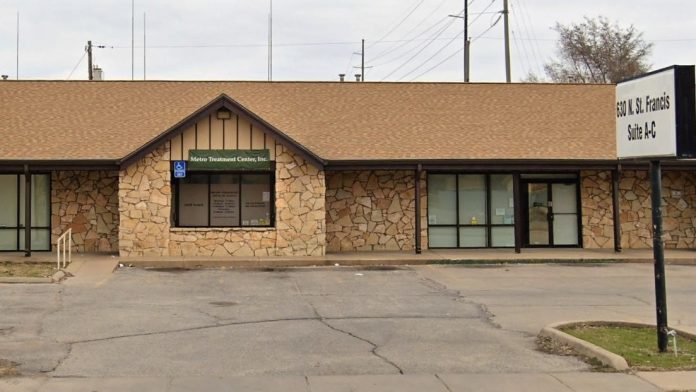Metro Treatment Center
630 Saint Francis Suite C
Wichita, KS 67214
Wichita, Kansas
316-263-1623
Get Help Now - 316-530-4598
 Who Answers?
Who Answers?

Addiction Treatment Programs
Adult Program
Alcoholism
Cognitive Behavioral Therapy (CBT)
Drug Rehab
Men's Rehab
Opioid Treatment
Women's Rehab
Teen & Adolescent Program
Adult Program
When an individual needs help with an addiction, they can find support at an adult program in Kansas. These treatment programs offer recovery services for men and women ages 18 and older.Alcoholism
Alcohol rehab in Kansas helps individuals who are struggling with alcohol use disorder learn about recovery, its benefits, and how to achieve it. Treatment focuses on motivation to change, skills to accomplish change, and how to maintain long-term success with sobriety.Cognitive Behavioral Therapy (CBT)
People often benefit from cognitive behavioral therapy in Kansas, as it teaches techniques for coping with negative thoughts, challenging emotions, and triggers. These exercises can be practiced on their own, so people in recovery have effective tools to maintain their sobriety.Drug Rehab
No single drug rehab in Kansas is right for everyone. Length, intensity, setting, and treatment methods vary. These can be tailored to meet each person’s needs. With the right program, individuals can successfully end their drug dependency and achieve long-term recovery.Men's Rehab
Often, men’s rehab in Kansas offers treatment for substance use disorders as well as dual diagnosis treatment. These programs can help men who are facing PTSD, ADHD, depression, anxiety, and bipolar disorder.Opioid Treatment
The most common types of opioid rehab in Kansas are detox, inpatient, intensive outpatient, and support groups. Each use evidence-based therapies to teach strategies for overcoming addiction and maintaining long-term sobriety.Women's Rehab
Women’s rehab in Kansas provides gender-specific treatment and allows participants to connect with other women who understand their challenges. This targeted support can be beneficial for long-term recovery.Teen & Adolescent Program
Treatment plans at a young adult program in Kansas typically encompass counseling for addiction as well as co-occurring mental health disorders. Young adults who are struggling with anxiety, depression, PTSD, or ADHD can get help for these disorders as well as substance use disorders.Levels of Care
1
Detox & MAT
Drug rehab in Kansas typically begins with detox. This process can last up to a week. During that time, you’...ll receive 24/7 supervision and medical assistance to cleanse your body of all addictive substances.Read More
2
Outpatient Rehab
Kansas outpatient rehab often includes several types of therapy, such as group, individual, and family. You’...ll attend several sessions per week, learning new skills and how to live a sober lifestyle. This treatment will continue for weeks, months, or even years, depending on your ongoing recovery needs.Read More
3
Aftercare & Alumni Program
Once you’ve completed early phases of treatment, aftercare rehab in Kansas provides continued support. As yo...u begin to face challenges of everyday life, this program gives you the tools you need to meet them. Ongoing counseling, support groups, and financial guidance are common aspects of aftercare, which may continue for a year or more after initial treatment.Read More
Accreditations

SAMHSA
Insurance
 TRICARE
TRICARE
Administered by the Department of Defense, TRICARE offers comprehensive military health insurance plans for ac...tive and retired military members and their families. Similar to PPO programs offered by private insurance companies, TRICARE covers multiple levels of care for addiction treatment, including detox, inpatient rehab, and outpatient services.Read More
 Self-Pay Options
Self-Pay Options
Paying for alcohol or drug rehab in Kansas using self-pay options means you are responsible for covering the c...ost of treatment. Examples of private pay include paying in cash, using a credit card, or taking out a personal medical loan.Read More
Contact Metro Treatment Center

Fact checked and written by:
Mari Mendoza, BS
Edited by:
Quentin Blount



